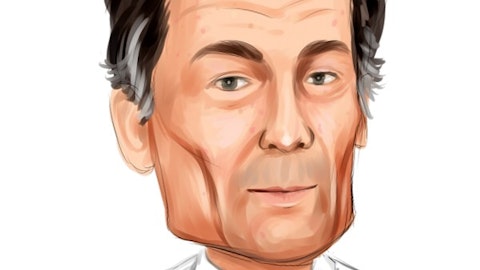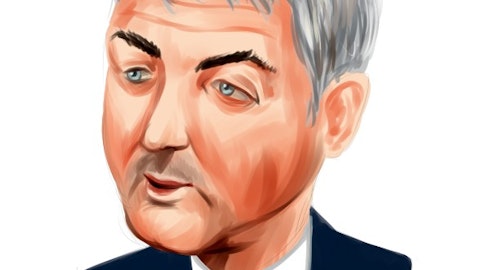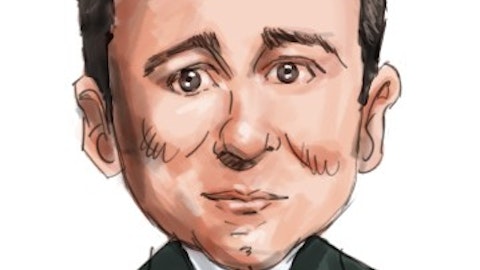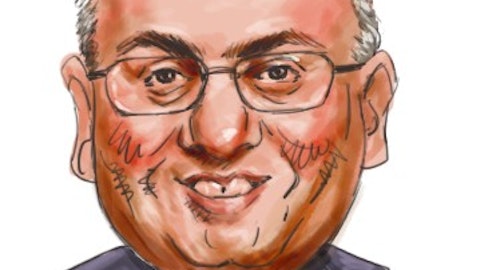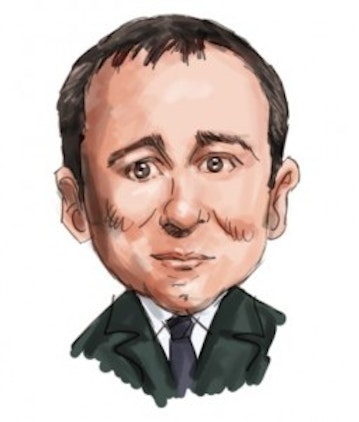
The two biggest hedge funds led by Citadel LLC CEO Ken Griffin posted returns of about 26 percent as of the end of the year compared to 2011 year end results, according to a person familiar with the performance. The Kensington and Wellington funds, which jointly have $7 billion under management and follow the same investment strategy with one directed at U.S. clients and the other at offshore customers, significantly outpaced the average worldwide 2012 hedge fund return of 5.5 percent, as estimated by Hedge Fund Research Inc.
China Aims to Expand Hedge Fund Investing by Licensing Foreign Shops (InstitutionalInvestor)
FOR INDUS CAPITAL PARTNERS, 2013 COULD BE THE year of the hedge fund in mainland China. General counsel and partner Brian Guzman and his colleagues at New York-based private investment fund adviser Indus, which was spun out of legendary hedge fund manager George Soros’ firm more than a decade ago, have been eyeing the Chinese market for some time. With regulators poised to allow foreign hedge funds to set up shop in the country’s second-largest city, they’re optimistic. Indus, which runs long-short strategies, plans to apply to the proposed qualified domestic limited partner (QDLP) program in early 2013. Under QDLP non-Chinese hedge funds would be able to establish marketing offices in Shanghai and gather assets from its institutional and high-net-worth investors…
Hedge funds win big with subprime mortgages (CNN)
That’s a bet that’s been paying off handsomely since 2010, according to Bloomberg Hedge Fund Indices. “It’s been an unusually attractive time to invest in the mortgage market,” said Steve Kuhn, head of Pine River Capital Management‘s $3.5 billion fixed income fund. “A tremendous amount of capital got lost or removed, and that’s created a very large hole.” It’s proved to be a profitable void for hedge funds to fill. For the most part, 2012 was a bust for hedge funds. In a year where the S&P 500 gained 13%, the average hedge fund returned just 5.5%, according to early estimates by Hedge Fund Research.
Ex-hedge funder Martoma pleads not guilty (NewsDay)
A former hedge fund portfolio manager charged with carrying out a record-setting insider trading scheme pleaded not guilty to insider trading charges Thursday as the prosecution hinted he would not be the last person arrested in the case. Mathew Martoma, 38, of Boca Raton, Fla., persuaded a medical professor to leak secret data from an Alzheimer’s disease drug trial between 2006 and 2008 when Martoma did work for an expert consulting service in New York, prosecutors said. The government said inside information Martoma learned about the joint drug trial by pharmaceutical companies Elan Corp. and Wyeth enabled other investment professionals to make $250 million illegally.
Jason Beaird joins Steel Vine Investment Fund as partner and director of marketing (HedgeWeek)
Beaird will serve as partner and director of marketing, primarily focusing upon marketing to accredited high net worth and institutional investors. Beaird’s past experience includes director of client service for Jetstream Capital from 2005 to 2011 and positions at Goldman Sachs and Merrill Lynch in private wealth management from 1999 to 2004. Immediately prior to joining Steel Vine Investment Fund, Beaird worked as a hedge and private equity fund placement agent with Constellation Associates through BTIG.
General Motors could face $918 million hit from bankruptcy-related lawsuit (NDTV)
A US bankruptcy judge could soon rule on whether the 2009 government-led restructuring of General Motors Company (NYSE:GM) improperly favored hedge funds, and an adverse ruling could cost the automaker nearly $1 billion. Judge Robert Gerber must decide whether a “lock-up agreement” in the restructuring sent $367 million to a group of hedge fund note holders at the expense of other creditors. A trust representing unsecured creditors has sued to undo the lock-up agreement, arguing that it was a last-minute deal secretly folded into GM’s bankruptcy to ensure the hedge funds’ support.
Narula’s No.1 Hedge Fund Gains 38% Betting on Mortgage Bonds (SFGate)
Fannie Mae and Freddie Mac have a friend on West 57th Street. That’s the New York address of Metacapital Management LP, the hedge fund founded by Deepak Narula. The much-maligned mortgage aggregators were taken over by the federal government in 2008 and have since absorbed $140 billion in taxpayer bailout money. The head of the House Financial Services Committee wants to abolish them. Yet they still own or guarantee more than half of all U.S. housing loans — and for that reason, the administration of President Barack Obama isn’t about to let them go belly up.
Like Wine: Hedge Funds Have a ‘Terroir’ (AllAboutAlpha)
Wine connoisseurs speak of the terroir of a wine, the specific characteristic that it acquires by virtue of where the grapes grow. With a New Year just underway, it may be well to mention that a firm conviction of the significance of terroir is the reason the French are unhappy when the makers of sparkling wines from anywhere outside of Champagne call their product “champagne.” This is our concern at AllAboutAlpha because Balter Capital Management has just prepared a statistical review of hedge funds on the basis of the cities in which they are located, its Hedge Fund Regional Performance Study. It is a study of the possible terroir of alternative investment management.
A Short Seller Takes on a Vitamin Vendor (WSJ)
When does a so-called multilevel marketing company go to the dark side and become a pyramid scheme? That’s the question aimed at Herbalife, HLF +12.89% the Los Angeles-based maker of vitamins and weight-loss pills. A month ago Herbalife was in apparent robust health. Annual sales were on track to soar past $4 billion, and its stock was sailing smoothly in the mid-40s. Herbalife’s market cap was a nontrivial $6 billion, ranking it with companies like Southwest Airlines LUV +2.39% and BMC Software, Inc. (NASDAQ:BMC) -0.80%.
What former hedge fund analyst learned from Bill Gates (BayouBuzz)
Former hedge fund analyst Sal Khan never intended to befriend Bill Gates nor flip the typical model of education upside down by posting tutoring videos on YouTube back in 2004. Khan, living in Boston at the time, was remotely tutoring his cousins in New Orleans and began noticing the effectiveness of uploading lessons online. Soon enough, he developed a following and Khan eventually quit his day-job to start Khan Academy in 2008, a non-profit with a mission to create a “free world-class education for anyone anywhere.” The academy’s website now has a library of over 3,400 videos covering K-12 math, biology, chemistry, physics in “digestible chunks” about ten minutes long.
Fairholme Announces Appointment of Fred Fraenkel as President (EON)
Fairholme announced today that Fred Fraenkel will now serve as President of the Firm. Mr. Fraenkel will continue to serve in his current role as Chief Research Officer of Fairholme Capital Management, where he oversees all of the Firm’s research activities. “Fred’s role as President is an exciting development for Fairholme,” said Bruce Berkowitz, Chief Investment Officer and Managing Member of Fairholme. “Fred’s extensive experience in the mutual fund and hedge fund space has proved invaluable to the Firm. This is just a formal announcement of what has already been the reality, and it allows me to focus on what I do best – investing.”
Fresh Off $1.3B Raise, Dyal Fund-Of-Funds Keeps Spending (Law360)
Dyal Capital Partners LP, a $1.28 billion fund-of-hedge-funds managed by private equity firm Neuberger Berman Group LLC, has bought a minority stake in Scopia Fund Management LLC, its fourth hedge fund investment since its launch a year ago. Terms of the deal, including the size of Dyal’s minority stake and the purchase price, were not disclosed. Scopia, which manages about $3.4 billion in assets, will retain control over its operations and investments, and managing partners Matt Sirovich and Jeremy Mindich will remain at the helm. Scopia…
Hedge Fund Manager Bernard Horn’s Stock Picks Include Infosys (InsiderMonkey)
Bernard Horn has been investing in global equities since graduating from the Massachusetts Institute of Technology’s business school in 1980. Polaris Capital Management, his current fund, was founded in 1995 and recently reported about $4 billion under management. Because of its global nature, Polaris has a particularly wide universe of stocks to invest in. Horn and his team like to narrow down the colossal number of publicly traded companies by using proprietary screening techniques to identify which ones have an attractive level of discretionary cash flow- cash flow from operations less maintenance capital expenditures- in relation to their market value.
Soros-backed Adecoagro takes land gains to $132m (Agrimoney)
Adecoagro realised more of the substantial gains within its 283,000-hectare landbank by selling one of its Argentine farms in a deal valuing it at 11 times the purchase price a decade ago. The South America farm operator, in which billionaire George Soros’s investment group is the top shareholder, said it had sold 51% of the company controlling its Santa Regina farm, in Buenos Aires province, for $13.0m, equivalent to $7,058 per hectare. The, unnamed, buyer has an option, expiring in June 2014, to buy the rest of the farm at $7,370 per hectare, taking the total bill to $26.1m.
U.S. Has Been Let Down by Its Leadership (Economonitor)
The deal reached in Washington on New Year’s day prevented the US economy from falling off the so-called fiscal cliff. However, given the dysfunctional nature of the American political system, it won’t be long before there is another crisis. Two months, in fact. If no action is taken by March 1, $110bn of spending cuts will commence. At about the same time, the US will hit its statutory debt limit, known colloquially as the debt ceiling.
Almost All of Wall Street Got 2012 Market Calls Wrong (Bloomberg)
From John Paulson’s call for a collapse in Europe to Morgan Stanley (MS)’s warning that U.S. stocks would decline, Wall Street got little right in its prognosis for the year just ended. Paulson, who manages $19 billion in hedge funds, said the euro would fall apart and bet against the region’s debt. Morgan Stanley predicted the Standard & Poor’s 500 Index would lose 7 percent and Credit Suisse Group AG (CSGN) foresaw wider swings in equity prices. All of them proved wrong last year and investors would have done better listening to Goldman Sachs Group, Inc. (NYSE:GS) Chief Executive Officer Lloyd C. Blankfein, who said the real risk was being too pessimistic.
Paulson Resort Inks New Deal for PGA West (WSJ)
A Coachella Valley golf resort that was recently purchased out bankruptcy by the Singapore government has struck a new deal with the PGA PG -0.63%, ensuring the home of The Bob Hope Classic will continue to operate under the PGA West banner. The owners of California’s La Quinta Resort & Club PGA West, a group led by hedge-fund manager John Paulson’s Paulson & Co., have inked a new deal that will see the 2,000-acre property remain a PGA-branded resort through 2061. The pact allows the hedge fund to transfer the licensing agreement to the resort’s new prospective owner: the real-estate investment arm of Singapore’s sovereign wealth fund, which wants to buy the Paulson-owned resort and three others for $1.5 billion.
The world’s most profitable hedge fund is… (eFinancialNews)
SAC Capital International, Cohen’s long/short equity strategy, tops the ranking of the 20 most profitable hedge funds in the world (see table). The $9bn fund, which was the third most profitable hedge fund in the previous year’s rankings, gained 10% in the first 10 months of last year, after 8% in 2011. It brought home $789.5m in profits. Performance puts it at 86th place in Bloomberg’s rankings of the best performing large hedge funds, but SAC was propelled up the profitability rankings by the high fees it charges, with a 3% management fee and performance fees of up to 50%, according to investors.

